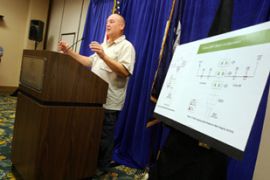BP ‘encouraged’ by testing results
Obama hails new procedure to halt Gulf of Mexico spill but says more work remains.

Obama urges caution
President Barack Obama, who has seen his US public approval ratings drop as the crisis dragged on, called the apparent success of BP’s efforts “good news”.
But he said on Friday that he was concerned to see media reports that suggested the capping of the well means the oil spill is finally over.
| in depth | |
|
“The new cap is good news, either we will be able to stop the flow or we will be able to capture all the oil until the relief well is done,” he said.
“[But] we won’t be done until we actually know that we’ve killed the well and that we have a permanent solution in place. We’re moving in that direction, but I don’t want us to get too far ahead of ourselves.”
Experts say between 35,000-60,000 barrels of oil have been pouring into the Gulf of Mexico daily for about 13 weeks, leaving millions of gallons sloshing around in the waters, threatening vulnerable wildlife and fouling the shores of five Gulf states.
A leak in a hose connected to one of the valves in the capping device, which had delayed the test and was repaired earlier on Thursday, had been only the latest setback for the British company.
Al Jazeera’s John Terret reporting from New Orleans on Friday said Obama is in a difficult situation because “this oil spill has been literally hanging over his White House like a very unwelcomed dark cloud”.
Pressure testing
BP has been pressure testing the new cap and its blow-out preventer and they are holding up pretty well, our correspondent said.
Since a rig drilling the BP oil well exploded on April 20, numerous efforts to contain the spill have failed, and the oil company has seen its share prices plummet.
Even if the cap proves successful, the troubles will not be over for the company.
“We just learned that BP is facing 307 court cases being brought by fishermen, tourist resorts and boat captains who claim their businesses have been completely wrecked this summer by the oil spill,” our correspondent said.
Thad Allen, the retired Coast Guard admiral overseeing the US government’s response to the spill, said the cap could succeed in stemming the leak, but remained an interim solution.
“The intention of the capping stack was never to close in the well per se,” he told reporters in New Orleans. “The best reason to be able to shut in the well right now … is it allows us to abandon the site if there is a hurricane.”
“We can certainly consider shutting in the well – that is a possibility and of course we would like to do that.”
BP’s plan is to funnel the leaking oil through pipes connected to the cap up to collection ships on the surface of the water.
However, the only proven way to permanently kill the leak lies in the drilling of relief wells to intercept the ruptured one.
The first of two such wells started in May is expected to intercept it by the end of July and plug it with drilling mud and cement by mid-August.
